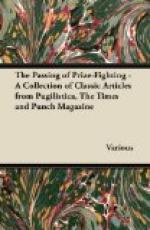* * * * *
I don’t think I can honourably recommend Mr. HUGH ELLIOT’S volume on Herbert Spencer (CONSTABLE) as light reading, though the ungodly may wax merry over the philosopher’s first swear-word, at the age of thirty-six, in the matter of a tangled fishing-line, and may be kindled at the later picture of a middle-aged sportsman shinning, effectively too, after a Neapolitan who had pinched his opera-glasses. Fine human traits these in a character which will strike the normal man as bewilderingly unlike the general run of the species. The serious-flippant reader, tackling Mr. ELLIOT’S elaborate and acute analyses, may get an impression of an obstinate old apriorist, a sort of White Knight of Philosophyland, with all manner of reasoned-out “inventions” at his saddle-bow (labelled “Homogeneity-Heterogeneity,” “Unknowable,” “Ghost Theory,” “Presentative-Representative"), which don’t seem, somehow, as helpful as their inventor assumes. And ’tis certain he took tosses into many of the pits of his dangerous deductive method. I don’t present this as Mr. ELLIOT’S view. He is respectful-critical, and makes perhaps the best case for his old master’s claim to greatness out of the assumption that SPENCER himself, stark enemy to authority and dogmatism, would have preferred his biographer’s critical examination to any mere “master’s-voice” reproduction of Spencerian doctrine. I wonder if he would!
* * * * *
Miss F.E. MILLS YOUNG’S newest story has at least this much merit about it, that no one who has seen the title can complain thereafter of having been taken unawares by the course of the narrative. That is perhaps as well, for, having discovered in the opening chapters a sufficiently charming Pamela living in perpetual honeymoon with a partner rich, good-looking and with no particular occupation to interfere with unlimited motor trips and dinner parties, we might have imagined the tale was going to remain a jolly meaningless thing like that all through, and so have been as much shocked as the heroine herself on reading the fatal letter. But, since we knew




